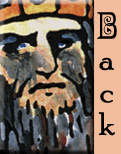|
It was in the beginning of the 1970's that I first became aware of the intricacies of tarot.
Literature and tarot decks were very scarce in Denmark at that time, and you just didn't stumble over
them. I didn't know what tarot actually was, when I first heard the name. The same was the case for
all others, so I decided to write a book about that mystic subject, just to find out myself and
let other people know. This is a method, I have learned from Colin Wilson.
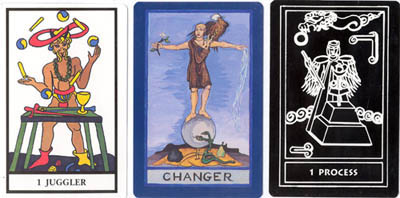 The first tarot card deck I owned was homemade, by taking copies of the Waite/Smith deck from Eden
Gray's book and pasting them on cardboard. I had never seen the real deck back then, so I colored it
according to my own taste, a time consuming task.
The first tarot card deck I owned was homemade, by taking copies of the Waite/Smith deck from Eden
Gray's book and pasting them on cardboard. I had never seen the real deck back then, so I colored it
according to my own taste, a time consuming task.
By and by, I acquired a few more decks. The first were Grimaud's version of the Marseilles pattern,
a German Egyptian style tarot and Deutsches Original Tarot, which had been published since the
1920's. After a while I also acquired the Universal Press edition of the Waite/Smith deck.
I was not quite satisfied with these decks, except the Waite/Smith pack, so I advertised regularly
in the Sunday papers for tarot decks. Most decks I was offered were game decks, amazingly
interesting imagery, but not of much use in the esoteric sense.
One day, it could have been in 1974, a young fellow called me. His wife was employed by a book
importer, and she had brought home an American tarot deck, he was willing to part with. That's how
John Starr Cooke and Rosalind Russel's T -The Tarot for the Aquarian Age entered into my life.
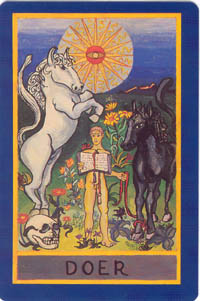 "T" was a different deck. A very different deck from what I had seen so far. Not only were the images
different, the suits and the names of the cards were also. It was also different in its outer
concept; The deck came, packed in a large cardboard case with no less then 3 booklets and a large
size poster, constituting a card spread, The Royal Maze. All other decks I had seen came in small
cardboard boxes.
"T" was a different deck. A very different deck from what I had seen so far. Not only were the images
different, the suits and the names of the cards were also. It was also different in its outer
concept; The deck came, packed in a large cardboard case with no less then 3 booklets and a large
size poster, constituting a card spread, The Royal Maze. All other decks I had seen came in small
cardboard boxes.
The authors of this deck were John Starr Cooke and Rosalind Sharpe, John Starr Cooke was born in
Honolulu in 1920. As a young man he was an actor and a dancer, a career an attack of polio put an
early end to. When this happened, John Star Cooke dedicated his life to an inner search, which also
led him to explore the tarot, which he had known about since he was a young kid.
T- The New Tarot for the Aquarian Age came into being, when a group of people gathered around
John Starr Cooke, in 1962-63 using a Ouija-board received instructions about how a new revised tarot
could be created. A tarot, that was in agreement with the dawning Aquarian age. The instructions, which
were answers to the questions the group asked to the Ouija-board, were so detailed, that the designs and
even the colors were described in such detail that John Star Cooke and his co-worker, Rosalind Sharpe,
could create an actual deck from them.
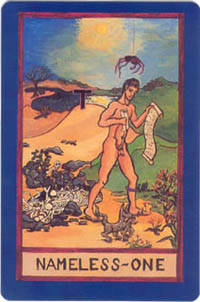 First a set of large size majors meant for meditation purposes was published. It is not obvious,
whether this set is the 1968 "limited edition" listed in the colophon in later editions. Regardless,
an ordinary edition was published in 1969. At least two further print runs were made in 1970.
(According to Ralph Metzner the majors were first offered for sale as a set of meditation posters).
First a set of large size majors meant for meditation purposes was published. It is not obvious,
whether this set is the 1968 "limited edition" listed in the colophon in later editions. Regardless,
an ordinary edition was published in 1969. At least two further print runs were made in 1970.
(According to Ralph Metzner the majors were first offered for sale as a set of meditation posters).
John Starr Cooke died at an early age in 1976. In 1979 Alice Cooke Kent, John's sister published
Communify - A Game consisting of a black and white edition of the majors from "T" together with two
other major arcana decks, likewise creations of John Starr Cooke. Communify - A Game was a limited
edition in book form, with the 3 x 22 cards printed on heavy cardboard, meant to be cut apart.
One of the other two major sets is called The Atlantean Tarot, whose imagery was drawn by John
himself, and inspired by his wife's dreams. The second, named Medieval Gypsy and drawn by Rosalind
Sharpe, was based on John's study of the traditional European tarot patterns.
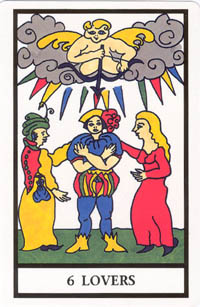 All together, the three major sets describe a development from the Atlantean times, which, though
not historical, can be considered symbolic for the origin of our dawning consciousness, through the
rational and patriarchal Medieval ages, up to an understanding of a dawning Aquarian age. The growing
consciousness through this large span of years, and the changes in the archetypal forms, is reflected
in the images. The three decks are meant to be used together, and instructional pages for the Game
of Communify (for two or better yet, four people) were included, even if John Starr Cooke's great
idea was, that his decks should inspire their users to find their own ways of exploring them.
All together, the three major sets describe a development from the Atlantean times, which, though
not historical, can be considered symbolic for the origin of our dawning consciousness, through the
rational and patriarchal Medieval ages, up to an understanding of a dawning Aquarian age. The growing
consciousness through this large span of years, and the changes in the archetypal forms, is reflected
in the images. The three decks are meant to be used together, and instructional pages for the Game
of Communify (for two or better yet, four people) were included, even if John Starr Cooke's great
idea was, that his decks should inspire their users to find their own ways of exploring them.
In the early 1990's, Alice Kent, the sister of John Starr Cooke, mentioned to me, that she was
working on a re-edition of the three decks, which would be published under the name of The Word of
One; the same title as a 400+ page transcript of the Ouija-board sessions, which had been made
available in a very small number of copies. Nothing happened for a rather long time but on
Christmas eve 1993, a parcel arrived. The Word of One Tarot in an excellent edition. Enclosed was
a letter from Chamba and Amy Cooke, John Starr Cooke's son and daughter-in-law, who told the sad
news, that Alice Kent died the preceding summer, but luckily she saw her publication project
happily finished.
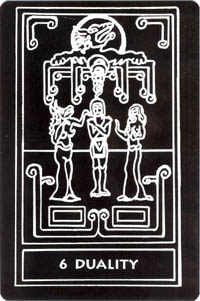 T - The New Tarot was an unusual tarot deck, and so was Communify - A Game. But The Word of One
Tarot is an even greater piece. It combines the virtues of both former products and makes
them better. In The Word of One Tarot you find not only the entire T - The New Tarot (in a better
color rendition than the first edition; techniques have improved since 1968) but also a colored
edition of Gypsy Medieval Tarot (in Communify... it was black & white) plus the negative printed
Atlantean Tarot; all three decks with the same back pattern, so they can be used as one large pack
of possibilities. The packing too, is excellent, a solid cardboard box, which also contains the
70 page booklet, that describes the decks and suggests some possible uses.
T - The New Tarot was an unusual tarot deck, and so was Communify - A Game. But The Word of One
Tarot is an even greater piece. It combines the virtues of both former products and makes
them better. In The Word of One Tarot you find not only the entire T - The New Tarot (in a better
color rendition than the first edition; techniques have improved since 1968) but also a colored
edition of Gypsy Medieval Tarot (in Communify... it was black & white) plus the negative printed
Atlantean Tarot; all three decks with the same back pattern, so they can be used as one large pack
of possibilities. The packing too, is excellent, a solid cardboard box, which also contains the
70 page booklet, that describes the decks and suggests some possible uses.
John Starr Cooke was not an artist, and his work shall not be judged as such. Even though, his
images have much more immediate appeal than what is presented by most of the American artists
behind the wealth of modern tarot decks. The Word of One Tarot is one of the very few modern
tarot packs I would call genuinely esoteric. I'll place it in the tradition as a deck next to
Crowley's Book of Thoth. It is not meant for the so-called card-readers (even if it has the added
advantage that it can be used by them). The main purpose of the deck is to give the user a better
possibility to reach the deeper layers of her consciousness. That is what tarot originally was about.
It shall be noted that an American tarot reader and therapist, David Quigley used T - The New Tarot
as basis for his treatise, The Romance Cycle - Sexual Evolution through Tarot Symbolism, in which
he restructured "T" and thus corresponded it with the Hinduistic Chakra system. Likewise was T
- The New Tarot analyzed to some degree in Ralph Metzner's Maps of Consciousness, a mantic bible
of the 1970's.
|
 The first tarot card deck I owned was homemade, by taking copies of the Waite/Smith deck from Eden
Gray's book and pasting them on cardboard. I had never seen the real deck back then, so I colored it
according to my own taste, a time consuming task.
The first tarot card deck I owned was homemade, by taking copies of the Waite/Smith deck from Eden
Gray's book and pasting them on cardboard. I had never seen the real deck back then, so I colored it
according to my own taste, a time consuming task.
 "T" was a different deck. A very different deck from what I had seen so far. Not only were the images
different, the suits and the names of the cards were also. It was also different in its outer
concept; The deck came, packed in a large cardboard case with no less then 3 booklets and a large
size poster, constituting a card spread, The Royal Maze. All other decks I had seen came in small
cardboard boxes.
"T" was a different deck. A very different deck from what I had seen so far. Not only were the images
different, the suits and the names of the cards were also. It was also different in its outer
concept; The deck came, packed in a large cardboard case with no less then 3 booklets and a large
size poster, constituting a card spread, The Royal Maze. All other decks I had seen came in small
cardboard boxes.
 First a set of large size majors meant for meditation purposes was published. It is not obvious,
whether this set is the 1968 "limited edition" listed in the colophon in later editions. Regardless,
an ordinary edition was published in 1969. At least two further print runs were made in 1970.
(According to Ralph Metzner the majors were first offered for sale as a set of meditation posters).
First a set of large size majors meant for meditation purposes was published. It is not obvious,
whether this set is the 1968 "limited edition" listed in the colophon in later editions. Regardless,
an ordinary edition was published in 1969. At least two further print runs were made in 1970.
(According to Ralph Metzner the majors were first offered for sale as a set of meditation posters).
 All together, the three major sets describe a development from the Atlantean times, which, though
not historical, can be considered symbolic for the origin of our dawning consciousness, through the
rational and patriarchal Medieval ages, up to an understanding of a dawning Aquarian age. The growing
consciousness through this large span of years, and the changes in the archetypal forms, is reflected
in the images. The three decks are meant to be used together, and instructional pages for the Game
of Communify (for two or better yet, four people) were included, even if John Starr Cooke's great
idea was, that his decks should inspire their users to find their own ways of exploring them.
All together, the three major sets describe a development from the Atlantean times, which, though
not historical, can be considered symbolic for the origin of our dawning consciousness, through the
rational and patriarchal Medieval ages, up to an understanding of a dawning Aquarian age. The growing
consciousness through this large span of years, and the changes in the archetypal forms, is reflected
in the images. The three decks are meant to be used together, and instructional pages for the Game
of Communify (for two or better yet, four people) were included, even if John Starr Cooke's great
idea was, that his decks should inspire their users to find their own ways of exploring them.
 T - The New Tarot was an unusual tarot deck, and so was Communify - A Game. But The Word of One
Tarot is an even greater piece. It combines the virtues of both former products and makes
them better. In The Word of One Tarot you find not only the entire T - The New Tarot (in a better
color rendition than the first edition; techniques have improved since 1968) but also a colored
edition of Gypsy Medieval Tarot (in Communify... it was black & white) plus the negative printed
Atlantean Tarot; all three decks with the same back pattern, so they can be used as one large pack
of possibilities. The packing too, is excellent, a solid cardboard box, which also contains the
70 page booklet, that describes the decks and suggests some possible uses.
T - The New Tarot was an unusual tarot deck, and so was Communify - A Game. But The Word of One
Tarot is an even greater piece. It combines the virtues of both former products and makes
them better. In The Word of One Tarot you find not only the entire T - The New Tarot (in a better
color rendition than the first edition; techniques have improved since 1968) but also a colored
edition of Gypsy Medieval Tarot (in Communify... it was black & white) plus the negative printed
Atlantean Tarot; all three decks with the same back pattern, so they can be used as one large pack
of possibilities. The packing too, is excellent, a solid cardboard box, which also contains the
70 page booklet, that describes the decks and suggests some possible uses.
